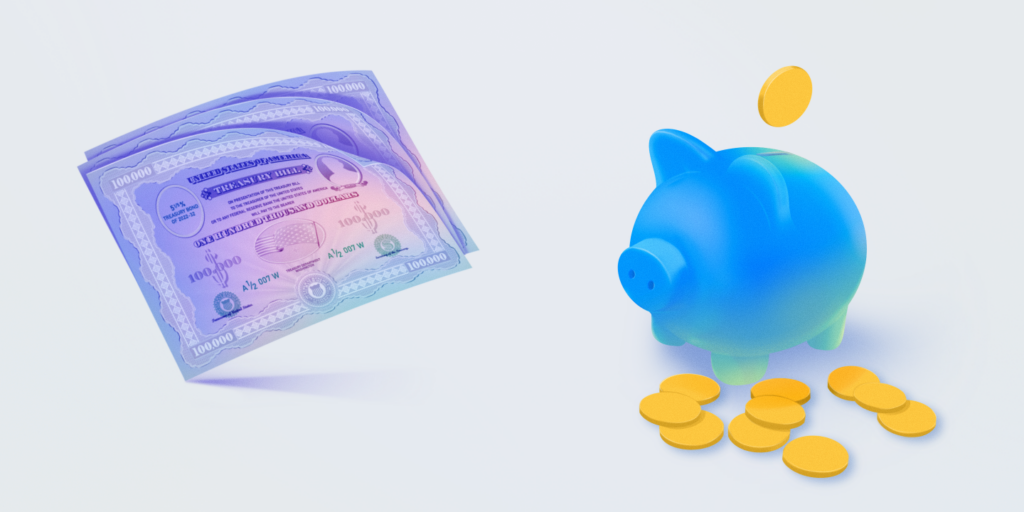When choosing a fixed-income investment that poses relatively low risk, should you choose Treasury bills or money market funds? Let this rundown shine a light on the differences between the two assets so you can decide on the best path forward.
Treasury Bills vs. Money Market Funds: What’s the Difference?

Table of Contents
What are Treasury bills?
Treasury bills (T-bills) are U.S. government debt securities with short-term maturity dates of one year or less.
How treasury bills work
T-bills are a low-risk investment solution that you can purchase through TreasuryDirect or via a participating brokerage like Public.com. Investors select how much money they want to spend (typically in increments of $100) and how long they want to hold the investment (aka the maturity length). Investors purchase T-bills at a discount. They receive the face value at maturity, which includes interest. Interest is fixed at purchase.
Example
-
Nadiya decides to invest in Treasury bills using her Public account. She sets up her Treasury account on the app and purchases $1900 worth of T-bills with a maturity length of 26 weeks with a 5% fixed interest rate. At the end of the 26 weeks, Nadiya gets $2000 back.
What are money market funds?
Money market mutual funds are a type of cash alternative that consists of short-term government debt securities (like T-bills, commercial paper or Certificates of Deposit, aka CDs). Money market funds are a highly liquid fixed income asset.
How money market funds work
Investors can purchase money market instruments as a mutual fund via a brokerage. The process is the same for any stock market fund purchases.
Example
-
Sam purchases $1,000 of a money market fund from they’re preferred brokerage. They earn interest every month, which reinvests into the fund and compounds future interest income.
Treasury bills vs. money market funds
One of the key benefits of a short-term investment is its liquidity—aka its ability to be easily converted into cash as needed.
| Treasury bills | Money market funds | |
|---|---|---|
| Liquidity | When using TreasuryDirect, you have to hold the asset to maturity unless you transfer it to a broker. However, you can use a Public Treasury account, which grants you the ability to transfer funds in and out on a 24/7 basis. | Government money market funds are largely liquid. One can start earning interest within 1 business day if not within hours. |
| Interest rates | Earn a 3.70%* yield on T-bills with a Public Treasury account. | Money market funds currently earn a yield of about 4%. |
| Tax advantages | T-bill interest income is exempt from state and local taxes. Gains are subject to OID (original issuer discount) rules. According to the Internal Revenue Service (IRS), “You can treat OID as zero if the total OID on a debt instrument is less than one-fourth of 1% (0.0025) of the stated redemption price at maturity multiplied by the number of full years from the date of original issue to maturity.” This is called the de minimis rule. | For taxable money market funds, interest income is fully taxable at the local, state, and federal level. Some money market funds are income tax-exempt, though these are listed as tax-free money market funds. |
| Risks and safety | Treasury government securities are backed by the full faith of the U.S. government. Public Treasury accounts are also protected up to $500,000 by the Securities Investor Protection Corporation (SIPC). There is a potential for loss if sold before maturity, but rates are fixed if you hold to maturity on your Public Treasury account. | Like other securities, money market funds are SIPC-insured up to $500,000. Look out for fees before signing on to any money market fund. |
| Deposit and withdrawal terms | The minimum investment for T-bills on TreasuryDirect or a Public Treasury account is $100. While competitor brokerages have an upper limit of $1 million in investments, Public has no ceiling. Min: $100 Maximum: N/A | You can invest in government money market funds at a value of $1–$1 million. Different brokerages may have different account minimums or limitations. |
Source: IRS.gov, Smartasset
The bottom line
The asset you choose ultimately depends on your investment objectives, but knowing the differences between T-bills and money market funds should help streamline your decision. Whether you buy T-bills on TreasuryDirect or via a Public Treasury account, or you decide you invest in a money market fund on your preferred brokerage, know the risks, opportunities, and the financial goals you have in mind.
FAQs
What is the point of a money market fund?
Money market funds are low-risk mutual funds that invest in high-quality, short-term debt securities such as government bonds and certificates of deposit. They offer returns based on short-term interest rates, making them an attractive option for investors to park cash
What are the disadvantages of investing in money market funds?
Are money market funds safe during a recession?
Money market funds are considered safe during a recession in that they can protect your assets for the time being and offer liquidity. However, they’re not the ideal place for long-term growth.

